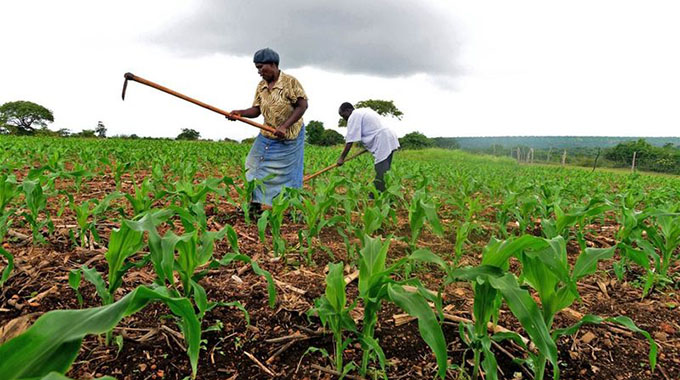
The ManicaPost

AGRICULTURE is the economic bedrock of Zimbabwe as it accounts for about 16 percent of the GDP and a source of livelihood for nearly 75 percent of Zimbabwe’s population. It accounts for 60 percent of raw materials for the manufacturing sector.
We are in the third week of October, and farmers should be winding up preparations for the 2019/20 summer cropping season. Farmers should be ready for the next crop, aware that Zimbabwe will receive normal to above normal rains in the first half of the season, which calls for early planting.
It’s either now or never as those who miss the first rains will technically be out of the game.
An analysis of past farming trends in Zimbabwe identifies shortage and prohibitive cost of key inputs like fertiliser and chemicals, poor access to agricultural finance, irrigation infrastructure and mechanisation as major contributors to low crop productivity.
Seed, fertiliser and chemical companies should act in good faith.
These inputs should be enough to meet the requirement of farmers and must be readily available, at affordable prices and at the farmers’ doorstep.
Farmers must not waste time or incur additional costs to purchase the inputs in towns. We are happy that both fertiliser and seed companies are warming up to the game.
They have assured the nation of enough stocks to meet or exceed the farmers’ demands. Of concern though is that it should not be about availability, but the cost factor.
As things stand, very few farmers can afford it.
A 50kg bag of top-dressing fertiliser ranges between $620 and $750 depending on the shop. A 50kg bag of Compound D ranges between $460 and $650. A 25kg of seed maize is currently selling at $1152 while a 10kg costs $350.
Why are our inputs always expensive? Producers must not sacrifice ethical practices for super profits as this inflates the cost of production for farmers.
Why should our farmers always be at the receiving end?
The net effect is that very few will afford and be motivated to till their field. The majority will leave their land untilled because the cost of producing a hectare of maize in Zimbabwe is double the cost in sister countries like Malawi, Zambia, Botswana or South Africa.
Yet fertiliser is fertiliser. One wonders what makes the fertiliser produced in Zimbabwe more special and expensive than that from Malawi, Zambia, Mozambique and South Africa.
We strongly need to interrogate the cost of our farming inputs if we are to attain the required food and nutritional security levels, fill our strategic grain reserves and produce surplus for export.
Farmers are justified in reverting to the use of traditional manure and compost instead of the pricey compound fertilisers.
Our reliance on rain-irrigated agriculture despite the fact that the seasons are increasingly being characterised by limited and unreliable rainfall concentrated during the beginning of the short rainy season with the remaining period tending to be relatively or absolutely dry — tends to be our major undoing.
Why then, despite highly variable and — in many cases – insufficient rainfall and a high incidence of droughts, is Zimbabwe’s food production entirely rain-fed?
Why is irrigation not playing a significant role in our agriculture?
Why do we talk of irrigation development and at the same time continue to suffer droughts of high proportion? Research has proven that irrigated crop yields are double or more comparable rain-fed yields. It is about time that irrigation development becomes a cornerstone for agricultural development in the country.
Zimbabwe has capacity to irrigate 2 244 800 hectares, but only 206 000ha is equipped, of which a paltry 150 000ha is currently irrigating. Reliable irrigation improves crop yields, makes multi-cropping possible, enables smallholders to cultivate high-value crops and provides year-round farm employment.
A switch to irrigated agriculture has huge positive implications for smallholder farmers.
One key area that also requires attention is agriculture infrastructure development and mechanisation.
If Zimbabwe’s agriculture is to evolve beyond national expectations, then, mechanisation has to be an integral component of the revival strategy.
If agriculture is truly the backbone of our economy, then mechanisation is the bedrock upon which agriculture is anchored.



